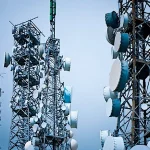How Telcos Are Experimenting Use of Electricity Poles, other Street Furniture for 5G Deployment
The upcoming 5G wireless in Nigeria is expected to deliver speeds up to 10 times faster than what consumers see on today’s 4G LTE networks, but 5G could also mean millions of new cell phone towers....

The upcoming 5G wireless in Nigeria is expected to deliver speeds up to 10 times faster than what consumers see on today’s 4G LTE networks, but 5G could also mean millions of new cell phone towers.
Would you want a cell phone tower or network base station in your neighborhood? For many people the answer is “no way.” But when 5G — the ultra-fast, next generation of mobile connectivity — arrives, experts say it’s likely be so because millions of new cell towers will spring up to handle the traffic.
The Nigerian Communications Commission (NCC) recently gave concrete expression to the Federal Government’s drive to promote indigenous innovative technologies in Nigeria’s telecommunication sector.
The NCC demonstrated this by organising the maiden prototype and research exposition aimed at showcasing no fewer than 10 prototypes, arising of from its sponsored Telecommunications-Based Research Innovation Projects in the Nigerian universities all geared towards finding solutions towards 5G deployment and customer experience.
Now, the Telecom Regulatory Authority of India (Trai) has taken up a pilot programme to use street furniture to accelerate expansion of telecom infrastructure in the wake of impending fifth-generation or 5G commercial rollouts.
“Trai has started conducting pilot projects for deploying street furniture in various parts of the country,” an industry source said, adding that the sector regulator is currently conducting the pilot at four locations including Kandla Port in Gujarat, Indira Gandhi International (IGI) Airport in Delhi, Bengaluru Metro Rail Corporation and Bhopal City, according to EconomicTimes report.
The development comes close to the heels of the telecom department’s (DOT) move to constitute a committee to review the availability of street furniture for seamless 5G network following Kerala’s proposal to efficiently use street furniture including electricity poles for telecom infrastructure deployment.
The department has already started considering the use of ‘street furniture’ to densely deploy next generation telecom infrastructure to overcome Right-of-Way (RoW) challenges, and an internal committee is currently reviewing the availability of street furniture for leveraging the seamless 5G network in other States.
“Kerala has become the first State to adopt the use of street furniture including electricity poles for the deployment of the 5G network. Various meetings are being undertaken by the telecom department to involve other States as well. Infrastructure providers are actively involved in the whole process,” said Tilak Raj Dua, director general, Digital Infrastrcuture Providers Association (DIPA).
Delhi-based telecom infrastructure providers group said that efficient deployment of street furniture such as bus-stop enclosures, utility poles, or any other street-level infrastructure that can house wireless equipment, proposes highly efficient tools in the mobile carriers’ toolboxes to bring their networks closer to the end customers.
In other to expedite the 5G-ready infrastructure availability, the department is leaving no stone unturned, and is actively promoting the use street furniture such as traffic signals, lit signals, lamp posts, phone booths, athletic field light poles, mailboxes, park benches, utility poles, billboards for deploying small-cell networks.









No Comment! Be the first one.